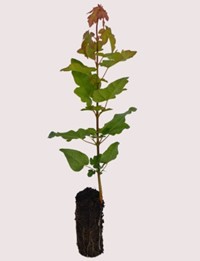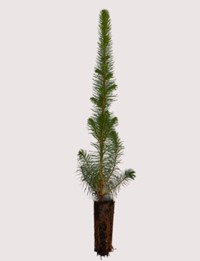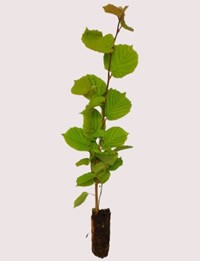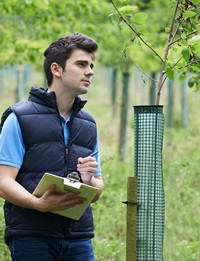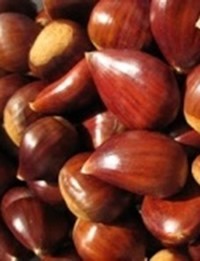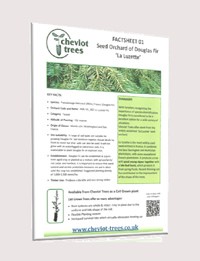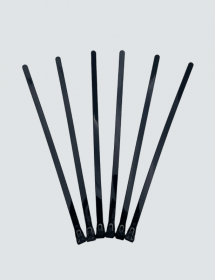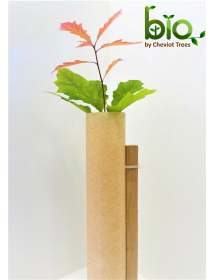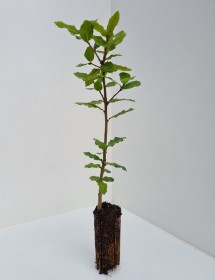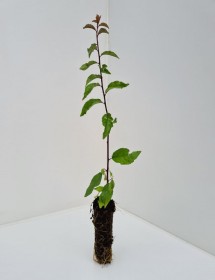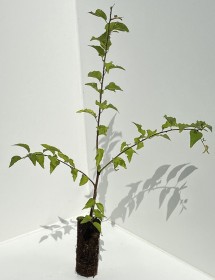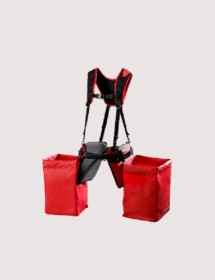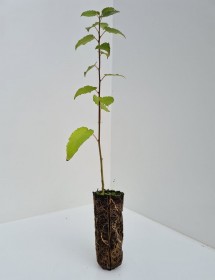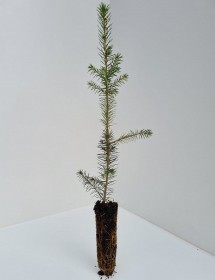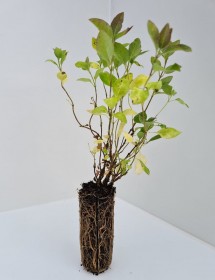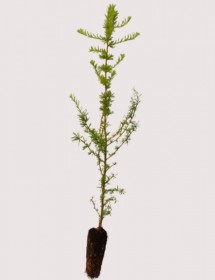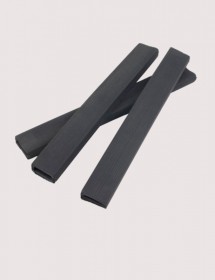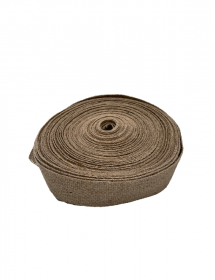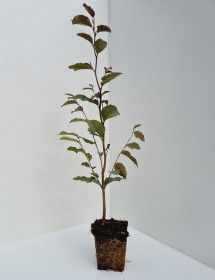Home
-
Releasable Cable Ties
£0.13from £0.05Releasable Cable Ties are ideal for fixing treeguards and netting to stakes.
Manufactured from nylon and featuring a wide thumb block with an easy to use release mechanism.
Very handy! Lots of our customers always keep at least 1 pack of Releasable Cable Ties in stock as they are so useful!
-
Rainbow Terra Shelter - Biodegradable
£2.96from £2.23The Terra Bio Shelter is a next generation biodegradable tree shelter that is manufactured from British grown natural wood residue and plant resins.
Using wood to protect woods.
The benefits of the Terra Bio Shelter:
- 100% natural materials - plastic free.
- Non toxic
- Certified to biodegrade in soil by TUV, according to strict ISO standards.
- Safe in marine and freshwater environments - ideal for riparian restoration work.
- High quality and fit for purpose
- No end of life costs for removal or recycling
Shelter features:
- Single wall cylindrical construction.
- Excellent light transmission.
- Pre-fitted ties for quick installation and maintenance.
- Flared rim to minimise stem abrasion.
-
Quercus rubra - Red Oak
£1.93from £0.96Quercus rubra -Red Oak; its claim to fame is its fiery Autumn foliage colour. Native to North America but widely planted in the UK since its introduction in the 1700’s. The timber has less value than its native cousin’s but it is still an aesthetically pleasing firewood crop or it can be used as a parkland tree.
The leaves are similar in shape and size to the native Oaks but they are more pointed and spiked in appearance.
A fast growing species with a strong central leader. Red Oak doesn’t support as many species of wildlife as our native Oaks but it is still a popular choice with nesting birds and pollinators.
-
Quercus robur - Pedunculate Oak
£1.75from £0.85Quercus robur - Pedunculate Oak is an iconic species that supports more life than any other tree species in the UK. One of the most economically and ecologically important trees species in Europe.
Pedunculate (or English) Oak is a large deciduous tree with a broad spreading crown. The stalkless leaves have 4-5 deep lobes and the acorns grow on stalks or ‘peduncules’, hence the name.
Pedunculate Oak prefers lowland areas whereas Sessile Oak prefers wetter upland areas.
To protect and aid establishment of Pedunculate Oak you may wish to consider Tubex Combitube which is a ventilated shelter that provides an open, airy environment for producing Oak.
-
Quercus petraea - Sessile Oak
£1.75from £0.85Quercus petraea - Sessile Oak is similar to English Oak although it prefers wetter upland areas. One of the most economically and ecologically important trees species in Europe.
Sessile Oak is a large deciduous tree with a broad spreading crown.
The stalked leaves have 4-5 deep lobes and stalkless acorns.
Sessile Oak is long lived so it makes a great choice for avenues and specimen tree planting.
-
Quercus ilex - Holm Oak
£2.60from £1.74Quercus Ilex - Holm Oak is an evergreen tree which is offers all year round colour. A good parkland tree and also useful for hedging or screening.
Whilst not native to the UK it still supports plenty of wildlife and is a great source of winter shelter for birdlife.
Oval dark green leaves which tend to be spiny, almost holly like when they are young. Elongated yellow catkins are produced in the summer which once pollinated by wind develop into acorns.
-
Pyrus communis - Wild Pear
£1.54from £0.67Pyrus communis (Wild Pear) is a long lived small to medium sized tree with a columnar habit. It has been cultivated in the UK since 995AD.
This species offers so much; not only from a visual perspective but it is also an important food source for birds and insects.
Deciduous, glossy green leaves which put on a colour spectacle in the Autumn turning orange and red. Mildly thorny stems and it is covered in white blossom in early Spring followed by small pears in Autumn.
A useful addition to a woodland or for inclusion as part of a hedging mixture.
-
Pseudotsuga menziesii - Douglas Fir
£1.45from £0.61Pseudotsuga menziesii - Douglas Fir is an evergreen conifer that was named after David Douglas who sent the first seed back from North America to Britain in 1827.
It has soft green needles with two grey bands underneath. Oval shaped cones hang and the bark is an attractive reddish brown colour.
One of the most important timber species in the world and widely planted in the UK, Douglas Fir is fast growing and the timber is strong and durable with few knots.
-
Prunus spinosa - Blackthorn
£1.45from £0.64Prunus spinosa - Blackthorn is widely used throughout the UK for good reasons; robust, useful and tolerant. Commonly used to form impenetrable hedging or as a stand alone large shrub/thicket.
The snow white flowers on Blackthorn mark the start of early Spring and appear before the leaves which are green and narrow in shape.
Once pollinated by insects the flowers develop into small dark fruits.
Blackthorn has long spikes and is densely branched - an ideal location for bird nesting.
Our cell grown Blackthorn plants are often used for hedge planting either on their own or mixed with other species such as Crab Apple, Hawthorn, Dog rose etc. at a planting density of 6 plants per metre.
-
Prunus padus - Bird Cherry
£1.83from £0.89Prunus padus - Bird Cherry is native to the UK and we tend to associate it with the northern part of the UK.
Tough and resilient with lots of value for wildlife and it provides an excellent show in the Spring in the Autumn.
Deciduous. Green leaves more oval like in shape than Wild Cherry turning yellow and orange in Autumn.
Almond scented stalks of blossom in the Spring which provide a good early nectar and pollen source for bees. Once pollinated, the flowers develop into reddish brown cherries with a bitter taste which are stripped from the trees by birds.
-
Prunus lusitanica - Portuguese Laurel
£2.03Prunus lusitanica - Portuguese Laurel has all the desirable properties of Cherry Laurel but has a smaller, pointed leaf.
Fast growing, tolerant and easy to grow it is a superb choice if you need a solid screen. It responds well to clipping and if desired, it is possible to achieve a very tight, formal hedge, more so than the Cherry Laurel - Prunus laurocerasus.
It does produce flowers and berries although these are quite insignificant as the main attraction is the large, dark green glossy leaves.
Its good tolerance of shade also makes it suitable for planting in open areas of woodland or on edges if shelter or cover is required.
3 plants per linear metre in a single row is normally sufficient to create a dense screen in time.
-
Prunus laurocerasus - Cherry Laurel
£2.03from £0.98Prunus laurocerasus - Cherry Laurel is one of the most popular hedging plants in our range.
Fast growing, tolerant and easy to grow it is a superb choice if you need a solid screen. We also grow Portuguese Laurel which has a smaller more pointed leaf.
Cherry laurel does produce flowers and berries although these are quite insignificant as the main attraction is the large, dark green glossy leaves.
Its good tolerance of shade also makes it suitable for planting in open areas of woodland or on edges if shelter or cover is required.
3 plants per linear metre in a single row is normally sufficient to create a dense screen in time.
-
Prunus cerasifera - Cherry Plum
£1.62from £0.70Prunus cerasifera - Cherry Plum is a fast growing, dense hedging plant which is an excellent choice for providing shelter.
Masses of pure white flowers smother the branches in early March before the leaves appear and these are followed in autumn by tasty red or yellow, spherical cherry-plums. You can make jam, wines or even liqueurs from the fruits and it forms a very dense hedge of thorny twigs making it an extremely effective barrier.
The Cherry Plum is an excellent attractant and nectar source for bees and other beneficial insects.
Ultimate height 25 feet (7.5 metres). Can be trimmed to any height above 4 feet (120 cm). Average annual growth rate 1 - 2 feet (45 - 60 cm).
-
Prunus avium - Wild Cherry
£2.03from £0.98Prunus avium - Wild Cherry is an attractive species not only aesthetically but also in commercial terms. The timber from Wild Cherry is highly valued in Europe with the top quality pieces destined for the veneer industry.
A large deciduous tree that requires plenty of space. Expect all year round interest with Wild Cherry. It has deep reddish brown shiny bark and the new bright green toothed leaves appear simultaneously with the long lasting clusters of white flowers. Once pollinated the flowers develop into globular shiny, deep red cherries. The leaves turn gold through to red in the Autumn to provide a spectacular show.
We produce this species from multiple seed sources including an Improved seed source. The breeding work to produce the Improved seed was carried out by the Future Trees Trust.
-
Pottiputki Planting Tool 63mm
£135.00Cheviot Trees are proud to distribute the Pottiputki range of planting tools and harnesses in the UK.
The Pottiputki is the original, tried and proven planting tool for Cell Grown trees. Manufactured in Finland from high strength steel the tool is ergonomically designed to achieve maximum planting rates with minimal planter stress. When used in combination with the Planting Harness the Pottiputki system enables planting to be carried out from an upright position.
Features and benefits of the Pottiputki:
- Ergonomically correct working position.
- Adjustable planting depth.
- Light and comfortable for extended use in the field.
- Rubber coated handle fitted with damping spring.
- Jaws are oil-hardened.
- Sturdy and robust construction.
-
Pottiputki Planting Harness c/w 2 flexible pouches
£130.17Cheviot Trees are proud to distribute the Pottiputki range of planting tools and harnesses in the UK.
The unique design enables outstanding levels of efficiency and the additional features ensure maximum comfort for the user. The harness is highly adjustable and comes complete with side cushions and two very durable soft plant bags.
The Pottiputkti planting harness complete with 2 pouches is the ultimate tool for the professional tree planter, especially when combined with the Pottiputki planting tool.
-
Populus tremula - UK Aspen
£1.73from £0.77Populus tremula - Aspen is a beautiful large fast growing tree which is native to the UK and the cooler regions of the northern hemisphere. It is characterised by its trembling and shimmering foliage.
Deciduous. Aspen is a very useful tree species which helps to stabilise soils, mitigate pollution plus it has a high ecological value for numerous insects and fungi. Aspen is a valuable and well regarded timber crop in Scandinavia for firewood, plywood manufacture and paper production.
We grow aspen from two different sources; a UK seed source and also a specific Scottish clonal collection. The latter option is more expensive than the generic UK source due to significantly higher propagation costs but it enables us to offer a reliable supply of plants from a Scottish origin.
-
Populus tremula - Native Aspen (Scottish)
£3.47from £1.65Populus tremula - Aspen is a beautiful large fast growing tree which is native to the UK and the cooler regions of the northern hemisphere. It is characterised with its trembling and shimmering foliage.
Deciduous. Aspen is a very useful tree species which helps to stabilise soils, mitigate pollution plus it has a high ecological value for numerous insects and fungi. Aspen is a valuable and well regarded timber crop in Scandinavia for firewood, plywood manufacture and paper production.
We grow aspen from 2 different sources; a UK seed source and also a specific Scottish clonal collection. The latter option is more expensive than the generic UK source due to significantly higher propagation costs but it enables us to offer a reliable supply of plants from a Scottish origin.
-
Populus nigra - Black Poplar
£2.03Populus nigra - Black Poplar is probably the rarest tree species in our range! Black Poplar is native to the UK and was once a common sight throughout the country but there are very few in existence.
Deciduous. Shiny green leaves which are heart shaped. Black Poplar is dioecious meaning male and female flowers are found on separate trees. The flowers are in the form of catkins which are red on male trees and yellow-green on females.
-
Populus Hybrid - Hybrid Poplar
£2.19from £0.98Populus Hybrid - Hybrid Poplar is a very versatile and vigorous clone which has been produced from natural plant breeding.
This clone will grow into a large tree with a stout stem. Ideal for wood fuel production, creating windbreaks and screening.
Deciduous with glossy green heart shaped leaves which turn brilliant yellow in autumn.
-
Platanus acerfolia - London Plane
£3.30from £1.57Platanus acerfolia - London Plane is extensively planted in Southern England as a street trees due to its tolerance for air pollution but it is considered to also be a useful forest tree for the UK as a result of climate warming.
A vigorous deciduous tree with distinctive flaky brown and grey bark.
London Plane has large bright green lobed leaves with interesting clusters of round fruits.
The timber is strong and widely valued for joinery / cabinetry.
-
Pinus sylvestris - Scots Pine
£1.39from £0.56Pinus sylvestris - Scots Pine is one of only three conifers native to the UK and our only native Pine. It is the worlds 2nd most widespread conifer after Juniper.
An important species for the UK for economic and ecological reasons.
A large evergreen conifer Scots Pine has long blue green needles that grow in pairs. Male and female flowers grow on the same tree and once the female flowers have been pollinated by wind they turn green and develop into cones. The mature cones are grey-brown in colour.
The redwood timber of Scots Pine is relatively lightweight yet strong and can be easily treated with preservatives to prolong its service life for exterior uses.
-
Pinus pinaster - Maritime Pine
£1.45from £0.64Pinus pinaster (Maritime Pine) is a fast growing, medium sized conifer native to the Mediterranean. This species is considered as an alternative to some more widely used trees if climate change proceeds as predicted. The best results can be achieved by planting in Southern Britain.
It grows best in lighter, acidic or neutral soils near the sea, but is can also grow on saline soils and very shallow soils.
Maritime Pine has stout evergreen needles in pairs, with attractive bright reddish-brown bark. -
Pinus peuce - Macedonian Pine
£1.73from £0.77Pinus peuce - Macedonian Pine is a handsome, upright coniferous tree which can grow to 30m tall. It has a pyramidal growing habit, with glossy young green shoots, showing deep blue-green needle-like leaves up to 10cm long. In the autumn, cylindrical green cones with white resin, each up to 15cm long, are borne on short stalks which ripen to brown later in the year.
The Macedonian Pine is very hardy, tolerating the high mountain alpine tree lines and thrives on free draining soils.
-
Picea sitchensis - Sitka Spruce
£1.39from £0.56Picea sitchensis - Sitka Spruce is economically important and the backbone of the UK forestry industry. This single species accounts for half of the UK’s commercial plantations.
Introduced to the UK in around 1850 although its use expanded enormously in the 20th century to help increase the UK’s perilously low percentage of forest cover.
Coniferous. Evergreen with sharp, flattened needles.
The dense foliage of Sitka Spruce provides good shelter for large mammals.
We grow our Sitka Spruce from Improved seed source to maximise the future timber yield. The sawn timber is versatile and utilised for many purposes including construction and packaging.
-
Picea pungens glauca - Blue Spruce
£1.89from £0.84We grow Picea pungens glauca - Blue spruce primarily for the purpose of Christmas tree production.
It is easy to see why this species is a popular choice. It has the traditional pyramid shape with stiff horizontal branches and a dense habit.
Slower growing then Norway spruce but worth waiting for!
The classic shape combined with attractive blue tinted needles makes it stand out when compared against other species – a premium choice.
We grow several other species of cell grown conifers which are all suited for Christmas tree production.
-
Picea omorika - Serbian Spruce
£1.45from £0.64Picea omorika - Serbian spruce as the name suggests originates from Serbia and is a large evergreen conifer with an alpine appearance.
It is similar to Norway Spruce although it has shorter branches with a downward curve and the crown is much more narrow and pointed.
Evergreen with sharp, pointed needles that have a rich sweet smell. The juvenile cones are purple tinged before ripening to a brown colour.
A very attractive species with a slender columnar habit that is ideal for parkland planting.
-
Picea abies - Norway Spruce
£1.39from £0.56Picea abies - Norway Spruce is one of the most important and widely distributed tree species in Europe.
With the exception of coastal areas it has no climatic limitations throughout the UK so it as been widely planted for timber production plus it has a high ecological value.
Coniferous. Evergreen with sharp, pointed needles that have a rich sweet smell.
The traditional species for Christmas tree production due to its busy habit and attractive scent. It does not have the cut tree needle retention qualities of other Christmas trees species such as Nordmann Fir, however the fast rate of growth and relatively low cost of production still makes it a popular choice – especially for larger display trees.
-
Nothofagus alpina - Rauli Beech
£3.30from £1.57Nothofagus alpina - Rauli Beech is a large deciduous tree native to Chile and Argentina.
Very fast growing with a broadly conical crown. Small oval, beech like leaves with deeply impressed veins. The leaves are green in the spring / summer turning red, yellow and orange in the Autumn.
Growth is more reliable in the milder and more humid western parts of the UK.
Rauli Beech produces a fine timber, comparable to European Beech.
-
Metasequoia glyptostroboides - Dawn Redwood
£3.47from £1.65Metasequoia glyptostroboides - Dawn Redwood is a large deciduous conifer which needs plenty of space to reach its full potential.
This ancient species was considered to be extinct until a small group were discovered in China in 1944. Whilst it has been widely planted throughout the world since then it is still carries the endangered status by the IUCN.
It has bright green needles which are light and feathery – quite similar in appearance to Coastal Redwood. The foliage turns to fiery shades of orange and brown in the Autumn which provides a spectacular show of colour.
A great choice for avenue and parkland planting.
-
Malus sylvestris - Crab Apple
£1.54from £0.67Malus sylvestris - Crab Apple is a good multi purpose native species. Good as part of a mixed hedge or woodland.
Deciduous. Glossy, oval leaves which has rounded teeth and sweetly scented blossom in the Spring which is pollinated by insects and bees. The pinky white blossom them develops into small, yellow-green apple like fruits.
Crab apple is an important food source for wildlife. The leaves are enjoyed by caterpillars of many moths, the flowers are an important early pollen source and the long lasting fruits are eaten by birds during the winter months.
-
Lonicera periclymenum - Honeysuckle
£3.18Lonicera periclymenum - Honeysuckle is useful addition to a native hedgerow as it can easily scramble its way through the hedge, knitting everything together.
Deciduous. The main interest beings is the trumpet like flowers which attract wildlife in their masses. The flowers are sweet in fragrance are rich in nectar and are particularly attractive to moths.
Berries follow in the autumn which are eaten by birds who also use the dense branches as nesting sites.
You don’t need many Honeysuckle in a hedge to make an impact. A ration fo around 5% of your total mixture is more than sufficient.
-
Lonicera nitida - Boxleaf Honeysuckle
£3.18from £1.40Lonicera nitida, commonly known as the Boxleaf Honeysuckle due to its small box type leaf that is pale green in colour.
It has as looser habit when compared against box so it should not be first choice for formal hedging but it is useful for planting on woodland edges as it offers good winter shelter and interest.
Fast growing and evergreen with small white flowers appearing in Spring.
-
Ligustrum vulgare - Wild Privet
£1.73Ligustrum vulgare - Wild Privet is a bushy, native shrub that we often supply as part of a native hedge mixture but it is also useful on the edge of woodlands or as game cover due to its good tolerance of shade.
It is semi evergreen so provides useful cover and shelter for wildlife in the winter thanks to its relatively untidy and gnarly habit.
Semi evergreen with thin, green pointed leaves. Small white flowers are produced in the Summer with dark purple berries that follow in the Autumn.
You may also wish to consider Oval Leaf Privet which has larger oval leaves with better retention properties.
-
Ligustrum ovalifolium - Oval Leaved Privet
£1.84from £0.89Ligustrum ovalifolium – Oval leaf privet is a fast growing semi evergreen hedging species with glossy dark green leaves and creamy white flowers during the summer months.
A robust species which tolerates regular pruning. Also suitable for coastal locations although you may notice some defoliation during winter.
You may also wish to consider Wild Privet which has narrower leaves and a looser growing habit.
Creamy white flowers during the summer months.
-
Larix x eurolepis - Hybrid Larch
£1.39from £0.56Larix x eurolepis - Hybrid Larch is a cross between European Larch and Japanese larch. It is hardier and has a faster growth rate than its parents.
Larch has a lot to offer. It is tough and robust, provides strong durable timber and offers fantastic landscape value in the Autumn when its foliage changes to a golden yellow colour.
Its native range is the mountainous regions in Central and Eastern Europe where it grows well at high elevations. It has grown successfully in the UK since it was introduced in the early 17th century.
The timber is noted for its hardness, strength, and natural durability so it is often used for exterior purposes.
The seeds are a tasty treat for red squirrels!
We also produce European Larch.
-
Larix decidua - European Larch
£1.39from £0.56Larix decidua - European larch is one of the few deciduous conifers.
It has a lot to offer. It is tough and robust, provides strong durable timber and offers fantastic landscape value in the Autumn when its foliage changes to a golden yellow colour.
Its native range is the mountainous regions in Central and Eastern Europe where it grows well at high elevations. It has grown successfully in the UK since it was introduced in the early 17th century.
The timber is noted for its hardness, strength, and natural durability so it is often used for exterior purposes. The seeds are a tasty treat for red squirrels!
We also produce Hybrid Larch.
-
Juniperus communis - Common Juniper
£3.03from £1.82Juniperus communis - Juniper is a small evergreen conifer that is native to the UK.
Small green needles with a prickly point. Juniper is dioecious so the male and female flowers grown on separate plants. Once pollinated by wind the female flowers develop into fleshy purple berries.
The berries are popular for flavouring gin but they are equally favoured birds who eat the berries. Juniper is also an important habitat for small mammals and nesting birds due the dense cover that it provides.
-
Jumbo Spacer Blocks
£1.48from £1.31Our Jumbo Spacer Blocks allow stakes to be positioned much further from the tree to allow more tree movement and to prevent possible damage to the root ball.
Made from environmentally friendly rubber.
-
Juglans regia - English Walnut
£3.47from £1.65Juglans regia - English Walnut is a large fast growing species. A well known tree which was first introduced by the Romans who valued its nuts. Native from South-East Europe to South-west China.
Widely planted throughout the UK an it makes a fantastic and well shaped specimen for planting in parkland area, avenues, riverbanks and as a hedgerow tree.
The timber is equally as valuable as the nuts and can be used for furniture manufacture and veneer.
The foliage is shiny, pinnate with individual oval pointed leaflets which turn yellow in autumn.
Flowers appear in early Summer in the form of long catkins and in the Autumn the flowers turn to brownish green fruits that are around the size of a plum. The brown nut is held inside the husk.
We also produce Juglans nigra - Black Walnut.
-
Juglans nigra - Black Walnut
£3.47from £1.65Juglans nigra - Black Walnut is a large fast growing species. We primarily grow this species for our forestry customers as the timber is highly valued, but it is also worth considering for its ornamental attributes.
Introduced to the UK from North America some 400 years ago, Black Walnut has a lot to offer.
The timber of Black Walnut is heavy, strong and durable with a value of 3-4 times that of Oak.
The foliage is pinnate with individual oval pointed leaflets which turn yellow in autumn.
Flowers appear in early Summer in the form of long catkins and in the Autumn the flowers turn to brownish green fruits that are around the size of a plum. The brown nut is held inside the husk.
We also produce Juglans regia - Common Walnut.
-
Ilex aquifolium - Holly
£3.47from £2.08A classic, native evergreen hedging plant, Ilex aquifolium - Holly growth rate is fairly slow at about 10-20cm a year, but what these hedging plants lack in speed, they make up for with seasonal interest and colourful foliage.
As a native hedging plant, Ilex is great for providing food and shelter to British wildlife. Birds such as blackbirds, chaffinches, robins and waxwings feast on the bright red berries and Holly plants provide a good source of nectar and pollen for bees. Holly hedging is the most beneficial to wildlife when left to grow naturally, as the bushy habit provides a safe, protected habitat
-
Hessian Tree Tie
£24.64from £14.83Our hessian tree tie is a simple and low cost solution to tying trees to stakes.
Supplied on a roll and is manufactured from 100% natural fibres.
A spacer block is not required as you can use use the hessian tree tie to form a cushion between the tree and the stake.
In time, the tie will biodegrade as the tree requires less support.
-
Fagus sylvatica atropurpurea - Copper Beech
£3.47Fagus sylvatica atropurpurea - Copper Beech is a vibrant and stunning variety of Beech that forms a very large specimen tree in a parkland setting. Very eye catching and perfectly suited for hedge planting either on its own or mixed with Green Beech.
Smooth, silver grey bark. Deep purple leaves in the Spring and Summer turning yellow then copper in autumn. The leaves are retained on the plant during the winter if the plant is maintained as a hedge. If you are comparing Beech or Hornbeam for hedging and you have damp soil and or you are in a cold exposed area then we would suggest using Hornbeam.
-
Fagus sylvatica - Green Beech
£1.83from £0.89Fagus sylvatica - Green Beech is one of the most widely planted broadleaved trees in Europe. A long lived species that is commonly used in the UK as a component in a mixed woodland, for hedging or for parkland planting due its very broad crown.
Smooth, silver grey bark. Dark green leaves turning yellow then copperin autumn. The leaves are retained on the plant during the winter if the plant is maintained as a hedge. If you are comparing Beech or Hornbeam for hedging and you have damp soil and or you are in a cold exposed area then we would suggest using Hornbeam.
-
Euonymus europeaus - Spindle
£1.75Spindle hedging plants provide a wonderful array of autumn colour. The four-lobed capsules burst into life with a vibrant shade of pink, opening to reveal orange fruits in the autumn. Euonymus europaeus hedging plants have dark green foliage that transforms into rich shades of red and yellow in autumn, adding another layer of colour to your garden. Spindle produces a dense hard wood that was traditionally used for making spindles and small implements.
A fast-growing species, Spindle is ideal for giving an array of colour to a hedge and is an excellent attractor of wildlife.
-
Eucalyptus dalrympleana - Mountain Gum
£2.19from £0.98Eucalyptus dalrympleana - Mountain Gum is one of the most popular species of Eucalypts grown in the UK due to its cold tolerance properties. A fast growing species which is very productive and adaptable to many purposes including biomass production, firewood, screening and foliage production.
Evergreen with ovate foliage which is copper tinged in colour when juvenile, turning blue/ green. Like most Eucalypts, the bark is often equally as impressive as the foliage and this species does not disappoint with shades of white and grey.
-
Eriophorum angustifolium - Cottongrass
£1.60from £0.65Eriophorum angustifolium - Cottongrass (often referred to as bog cotton) is an evergreen perennial that forms vigorously spreading clumps. It enjoys the harshest of environments - boggy, open, peat areas where there is little other competition.
Pure white silky haired seed heads form after flowering. Cottongrass seeds and stems are edible and can used for medicinal purposes. The fluffy seed heads have also been used as a substitute to stuffing pillows.
It provides an excellent habituate for wildlife and is a pond essential.

